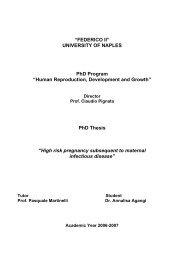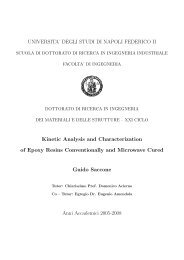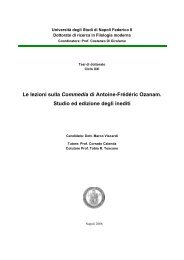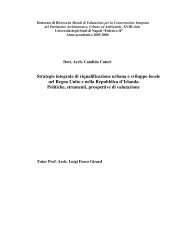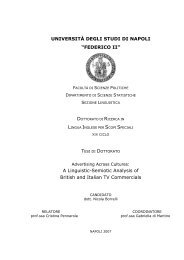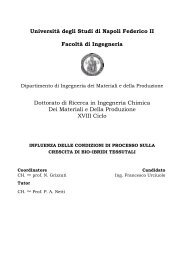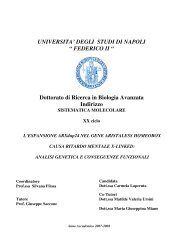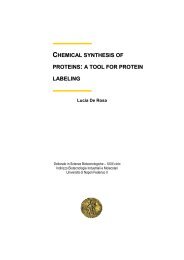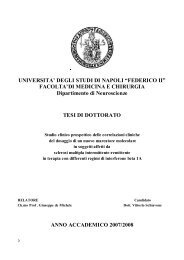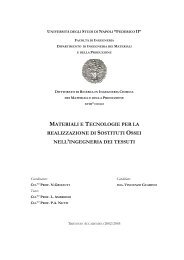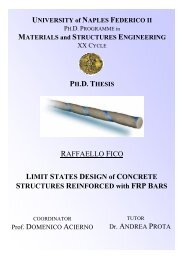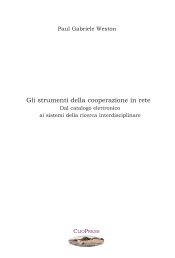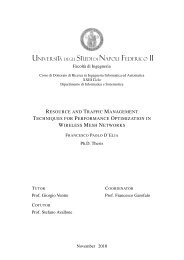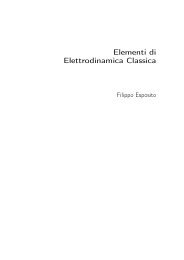- Page 1 and 2: UNIVERSITÀ DEGLI STUDI DI NAPOLI F
- Page 3 and 4: 2.1 Blindness and visual impairment
- Page 5 and 6: 5.1 The language of audio descripti
- Page 7 and 8: Acknowledgments It was May 2007 whe
- Page 9 and 10: Perhaps only in a world of the blin
- Page 11 and 12: Matamala and Rami 2009), only few r
- Page 13 and 14: etween sight and hearing in films,
- Page 15: 1. Introduction to audio descriptio
- Page 19 and 20: audio description could be intended
- Page 21 and 22: lighting, etc. Descriptions are del
- Page 23 and 24: very important actor/actress, the d
- Page 25 and 26: theatre shows. Sport matches can be
- Page 27 and 28: to organize touch tours or similar
- Page 29 and 30: 1.3.2 Special guidelines for specia
- Page 31 and 32: prevents the audio description from
- Page 33 and 34: should evocate more than precisely
- Page 35 and 36: All guidelines in these countries a
- Page 37 and 38: speaking, the first principle of a
- Page 39 and 40: team to decide whether the credits
- Page 41 and 42: Audio description is a relatively y
- Page 43 and 44: only, 12 films were made accessible
- Page 45 and 46: description was screened for the fi
- Page 47 and 48: TV Cabo and Lusomundo Gallery start
- Page 49 and 50: Festival held yearly in Rome. The a
- Page 51 and 52: importance of training and suggests
- Page 53 and 54: commitment to regular provision of
- Page 55 and 56: homogenous group, be it because of
- Page 57 and 58: this section mainly from a geograph
- Page 59 and 60: Elizabeth Jones and Gabriela Argiro
- Page 61 and 62: in digital video collections. His a
- Page 63 and 64: description for the blind and acces
- Page 65 and 66: minimizing the risk of marginalizat
- Page 67 and 68:
whose activities range from trainin
- Page 69 and 70:
Adam Mickiewicz University, coordin
- Page 71 and 72:
perspective, the role of the audio
- Page 73 and 74:
the market in 2006. Since then, bli
- Page 75 and 76:
without problems. From the provider
- Page 77 and 78:
etween the two different tracks bro
- Page 79 and 80:
lind from the rest of the audience.
- Page 81 and 82:
most popular theatres of countries
- Page 83 and 84:
programme. In this case, it is not
- Page 85 and 86:
The European Union protects the rig
- Page 87 and 88:
subtitling more and more programmes
- Page 89 and 90:
independent, non-discriminated and
- Page 91 and 92:
updated information about the perce
- Page 93 and 94:
(e.g. the Netherlands, Poland, Swed
- Page 95 and 96:
the anatomical structures of sight,
- Page 97 and 98:
1 2 3 4 Maximum less than Minimum e
- Page 99 and 100:
countries, subdivided into 17 Regio
- Page 101 and 102:
dependent on contextual factors. In
- Page 103 and 104:
will also increase. In addition, et
- Page 105 and 106:
cataract, glaucoma and dry eye. In
- Page 107 and 108:
The human eye belongs to a group of
- Page 109 and 110:
ehaves exactly the opposite. Accord
- Page 111 and 112:
cornea is scarred (this condition i
- Page 113 and 114:
mechanisms. The consequences of POA
- Page 115 and 116:
Macular degeneration is the first c
- Page 117 and 118:
2.6 The development of visually imp
- Page 119 and 120:
why haptic and hearing sensations w
- Page 121 and 122:
„thinking spaces‟. We will see
- Page 123 and 124:
Presenting an object to a blind per
- Page 125 and 126:
This area of intersection becomes t
- Page 127 and 128:
places, other devices need to be co
- Page 129 and 130:
The first audio books were also del
- Page 131 and 132:
for visually impaired customers. Th
- Page 133 and 134:
Audio description can be seen as a
- Page 135 and 136:
subtitles and title bands) „trans
- Page 137 and 138:
great help. Indeed, they borrow the
- Page 139 and 140:
(original dialogue versus subtitles
- Page 141 and 142:
Reiss 1971) and evaluate the audio
- Page 143 and 144:
not prioritize or organize the way
- Page 145 and 146:
ultimate proof but will always rely
- Page 147 and 148:
translation, seems to be a controve
- Page 149 and 150:
with specific ideas in one country
- Page 151 and 152:
In the interpretive use a) thought
- Page 153 and 154:
of language per se. With this in mi
- Page 155 and 156:
their communicative needs. Maybe a
- Page 157 and 158:
participants. In audio description,
- Page 159 and 160:
unity of the film. As it can be not
- Page 161 and 162:
(11) In gold letters against brilli
- Page 163 and 164:
The film is based on the novel by T
- Page 165 and 166:
linguistic and semiotic choices con
- Page 167 and 168:
is translated into short sentences
- Page 169 and 170:
is strictly linked to the idea of t
- Page 171 and 172:
of visual images is recorded images
- Page 173 and 174:
transformation from images to words
- Page 175 and 176:
who criticized the lack of „conne
- Page 177 and 178:
„primary‟ or „spoken‟ visua
- Page 179 and 180:
Semantic refers to the way images r
- Page 181 and 182:
more a description or a narration?
- Page 183 and 184:
However, there are sentences where
- Page 185 and 186:
3.6.1 Audio description as a tool f
- Page 187 and 188:
touch and the hearing), but also to
- Page 189 and 190:
Drawing on these considerations and
- Page 191 and 192:
the “descriptive gestures” cate
- Page 193 and 194:
complete the transfer process the f
- Page 195 and 196:
description could be also extremely
- Page 197 and 198:
2. Original culture-specific object
- Page 199 and 200:
This means that an interest in audi
- Page 201 and 202:
on a more general level, they are b
- Page 203 and 204:
professional setting, one of which
- Page 205 and 206:
4. Audio description from a filmic
- Page 207 and 208:
in this differencing potential the
- Page 209 and 210:
articulation), it can be considered
- Page 211 and 212:
asic types of signs 152 : indexes,
- Page 213 and 214:
language of audio description is du
- Page 215 and 216:
Cinematographic codes 2- Codes of i
- Page 217 and 218:
As to the visual codes, denominatio
- Page 219 and 220:
perception instruments. The „form
- Page 221 and 222:
and researchers. However, in countr
- Page 223 and 224:
carries another language. In this c
- Page 225 and 226:
However, it is not always possible
- Page 227 and 228:
presence of moving objects, persons
- Page 229 and 230:
Level of representation: time Time
- Page 231 and 232:
the „spectators‟ is not limited
- Page 233 and 234:
screen and helps identifying where
- Page 235 and 236:
not only a matter of words. Indeed,
- Page 237 and 238:
or speak but also the settings and
- Page 239 and 240:
This creates the illusion that the
- Page 241 and 242:
epresentation. In this sense, an an
- Page 243 and 244:
objects. Finally, the point of view
- Page 245 and 246:
metalinguistic communication is the
- Page 247 and 248:
continuum, audio description would
- Page 249 and 250:
experiments based on the use of the
- Page 251 and 252:
is occurring on screen or on stage.
- Page 253 and 254:
(2000) also suggests the use of the
- Page 255 and 256:
Ballester Casado (forthcoming) also
- Page 257 and 258:
standards in audio description and
- Page 259 and 260:
context, „viewpoint‟ by words r
- Page 261 and 262:
develop a computational account of
- Page 263 and 264:
framework allowed by dialogues. For
- Page 265 and 266:
with respect to film content, and w
- Page 267 and 268:
far have approached their role in a
- Page 269 and 270:
“concerned with the experiential
- Page 271 and 272:
defined as a qualitative difference
- Page 273 and 274:
Micro-features Planning Spoken Lang
- Page 275 and 276:
and to be inserted in the pauses wi
- Page 277 and 278:
Secondly, being the audio descripti
- Page 279 and 280:
attributed to a traditional text ar
- Page 281 and 282:
dissolution and fragmentation which
- Page 283 and 284:
and blond hair piled elaborately on
- Page 285 and 286:
towards it. Drawing on these consid
- Page 287 and 288:
for the editing phase would be a pr
- Page 289 and 290:
applied to narrative as a means of
- Page 291 and 292:
esearch. Indeed, as we have seen, t
- Page 293 and 294:
attributed by the IMDb. On the IMDb
- Page 295 and 296:
Storyline In 1941, Italy allies wit
- Page 297 and 298:
Goofs Errors made by characters, po
- Page 299 and 300:
Title Year (P) Year Captain Corelli
- Page 301 and 302:
Title Year (P) Year Lady and the Tr
- Page 303 and 304:
Title Year (P) Year See no Evil, He
- Page 305 and 306:
Title Year (P) Year The Great Escap
- Page 307 and 308:
2006), which is based on almost the
- Page 309 and 310:
Ad Ac An B C Cr D F Fan H R Mu Mi T
- Page 311 and 312:
same quantity of scripts for each o
- Page 313 and 314:
In both cases, it is possible to re
- Page 315 and 316:
on the edge of the bed. („The Oth
- Page 317 and 318:
01 00 00 A sphinx is silhouetted ag
- Page 319 and 320:
protected by copyright and any broa
- Page 321 and 322:
01 01 52 An image appears from the
- Page 323 and 324:
Title number: 3 In Cue Time(HH MM S
- Page 325 and 326:
time out codes are assigned to each
- Page 327 and 328:



